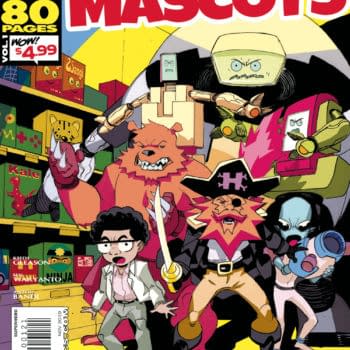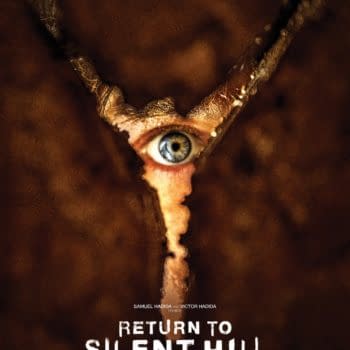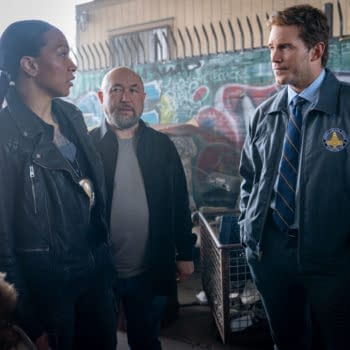Posted in: Movies | Tagged: August: Osage County, film, interview, john wells
John Wells On August: Osage County, Praising The Weinsteins And The Julia, Julianne, Juliette Confusion

August: Osage County is a powerful, compelling character drama by John Wells based on the Tracy Letts' Pulitzer Prize and Tony Award play. Starring Meryl Roberts, Julia Roberts and Ewan McGregor, the film has been nominated for three Screen Actor Guild awards, a BAFTA for Julia Roberts, and two Academy Awards, for Best Actress and Best Supporting Actress.
Back in December I sat down with director John Wells to talk about Harvey Weinstein, adapting plays to screen … and hiring a Julia, a Julianne and a Juliette.
"What a mistake that was!" laughs John, when asked if there was any confusion after hiring Julia Roberts, Juliette Lewis and Julianne Nichols. "I always like to put up pictures in my office when we cast people so we can see where we are, especially because we're trying to create a family. And I was looking and looking and then went 'Oh shit!' I ask how he managed to keep them all separate and he tells me that as Meryl stays in her part a lot, "because it's a difficult role to do, I actually ended up calling everyone by their character names and it helped."
August: Osage County follows a dysfunctional family who come together for the patriarch's funeral. Meryl Streep plays the matriarch Violet, an old battleaxe who herself had a dysfunctional upbringing and is now addicted to a cocktail of prescription drugs. Julia, Julianne and Juliette play her three daughters (Barb, Ivy and Karen), who for their different reasons have either stayed in the County or left.
When I speak to John on a cold December day in London, he is approachable and warm, answering each question with consideration and intelligence and appearing genuinely interested in my opinion as well. He speaks of directing a cast of such incredible talent which includes Oscar nominees and winners with joy.
"We set up some tables and did the read through", says John. "I looked down the table and there's everybody you'd ever want to work with, and at the end is my friend George, George Clooney who was producing it, and I was like this is never going to happen again in my life!"
But he explains that it was actually quite easy to get this cast together, as Meryl, Julia and John all have the same agent and, in a stroke of luck, had already told their agent that they would be interested if the script were good. When asked how he felt about this, John tells me that these things are usually "really, really hard and every time it was meant to be moving forward to getting made, it was moving forward to getting made!"
And what about John himself?
"I was having lunch with Harvey Weinstein about something else we were working on", he says, "and in the middle of it he asked me about an actor I had recently worked with and I said I enjoyed it – and I'm not going to say who it was because he didn't end up in the film – and he said well he would be great in August: Osage County and you should direct it, and I said great, because Harvey says stuff like that all the time.
"And I got back to my office, and my agent called and said 'So you're directing August: Osage County? Is there a script?!' but then they sent me the script, and I started meeting with Tracy Letts and we worked on it for a bit, then I showed it to Meryl, and we met and she said yes and I showed it to Julia and she said yes and then we were sort of making a movie! And I called Chris Cooper who is a friend and said you're gonna come and do it, just be there, and he said alright, but then everybody else was auditioned for – with the exception of Ewan who only became available about two weeks before. He wasn't supposed to be available and then at the very end I got a call saying he could do it. It just kind of came together."
John studied at Carnegie Mellon School of Drama and then went into writing television ("because they would pay me!") before directing and producing. John was behind some of the 1990's most loved television shows including E.R., Third Watch and The West Wing, before going on to produce films such as One Hour Photo and White Oleander.
With a long history in television and producing I ask what prompted the move into directing films, which began in 2010 with The Company Men. He admits a large part of it was down to family. "I had a lot of friends who were directors and I [had seen] the strain," he says.
"But now my children are old enough, and it all sounds a bit new age-y but I sat them down and said 'If I do this I'll have to go'. It was a family consideration."
Knowing John has a history in the theatre – he now has a three year directing program at CMU named after him – there must be pressure in adapting a play for the screen, and I ask if he consciously considers the staging of a play he has loved or instead tries to erase it from his mind. "In my case, I completely forget about it" says John.
"Partially because it's a proscenium and you very much don't want to be stuck in that same proscenium. There were a couple of times I tried to make some visual reference to it early on in the picture – there's a shot of Sam Shepard as Beverly in the study and Meryl coming down the stairs, which I intentionally set back as a proscenium piece and which was in my head the entry from where it was going to move from being a play into a film – but that may be an over intellectualisation on my part!"
John acknowledges that the state of Oklahoma and the house itself are characters in their own right, and he decided to base the cast and crew out of Bartlesville, OK for the three months of production, making them drive 45 minutes to the house every day. I wonder if the actors were at all influenced by open plains and the heat of Oklahoma. "Very much, very much" says John.
"And it was why I insisted on shooting it in Oklahoma. Being there is very important because it's a very specific place, and in the US, particularly when you live in LA or NY, you have an image of that part of the country which is it is thought of as being highly conservative and very close-minded, but that's not really what it is. The place isn't like that, the language isn't like that, the accents aren't like that, and so I wanted everybody to be there to get a real experience of the place.
"There was a certain amount of grumbling about going to Bartlesville, OK for three months, but as soon as everyone got there they went 'Oh okay, I get why you insisted we came out here." It's beautiful, rugged and lonely place."
August: Osage County, the play, was written in 2008 and won the Pulitzer Prize for Letts and Tony Awards for Best Leading Actress, Best Featured Actress and Best Director. A hugely beloved play, as with any book or stage adaptation there are always hesitations from fans, and John believed that nothing should be changed too much – "It won the Pulitzer Prize and the Tony!" he exclaims. "So I took the position that the script was already fairly well loved and there's no improvisation whatsoever.
"That said, there was a lot of people describing the vast spaces, and the heat, and you were going to see all that so you didn't need to have characters talking about it. But at the first read through every single actor had the Samuel French version of the play and they had highlighted every line that they had liked that had been cut from the screenplay!
"During rehearsal I would see those scripts come out and someone would say 'Well, can I still say…' and I would say about 40% of that ended up in the film and 60% was cut but was essential for the actor to get from one spot to another.
"And we weren't sure we were cutting the right things so we were constantly asking ourselves, and that process continued all on through editing. We only locked the film about three and a half weeks ago (as of Dec 19th) and that was always what it was – did we know this already? Do we need to be told this again? Are we just involved with the line because we like the way it sounded because Tracy is a wonderful writer, or is it actually telling us something we need to know?
Fans of the play will notice there is one major change between the play and the film, but as John explains, despite looking for a number of cinematic ways of showing the passing of time it ultimately wasn't needed in the context of the play.
"I had a concern that we were in literal time for 90% of the play and then at the end, Tracy goes through a series of monologues which jump two weeks. And I kept saying, I can't really pull pages off the calendar. We didn't give up early and there were a couple of those scenes that I loved and I shot – one is a long monologue by Barbara about what she knew, when she's talking to Johnna, about her father, and it's a bit of a soliloquy on the Bush wars.
"But as I said, it's out of the context of the play when we see it as a film, so that's why. And I felt emotionally the character was already going through so much with all the reveals – but that was one of our longest conversations."
There are several key scenes throughout the film, including the all-important dinner table scene where every cast member is in attendance, and which ends with a brawl that has been bubbling for the first half of the film. Julia Roberts has previously admitted she was daunted when it came to this fight scene and John says they only needed to do it twice because Julia and Meryl "went down hard!"
"That was very interesting because [Julia] kept saying to me from the first time we had breakfast to talk about the piece, she goes "I get to strangle Meryl Streep? I don't know if I can strangle Meryl Streep!" And then the day we got there she was like "I get to strangle Meryl Streep! Because Meryl had been yelling at her for weeks!
"And I had a stunt coordinator there who would help them and stand-ins, but neither of them wanted stand-ins and, man, when it came, they did it. She jumped across that table! We had a little pad under the carpet but it was like someone had dropped a 50lb bag of cement, it was hard. And Meryl got a little bruised; she had a big bangle-y bracelet on and it got caught but she got up and was like 'let's go!'
"[Meryl] also wanted to do the fall in the field. It seemed like it would be so easy but there had been a drought so all that cut hay was like knives, and her hand got all cut up, and we had the medic out there cleaning her up – she's a tough broad!"
After some questioning, John admits that the scene with Meryl and Julia in the field is also his favourite. "It was a beautiful day, it was early on the shoot – one of the few scenes shot out of continuity because of the time of year we were shooting – and we got out there and they fell to the ground and we were setting up the next shot and I went over to sort of sit beside them while we waited for the next camera angle to be set, and the sun was at a certain spot and there were clouds and we looked at each other and we were just like 'we get to do this'. There's a great privilege in being in this beautiful place, working on this material, and you want to remember those moments."
With two Oscar nominations for Meryl and Julia this year, John's relationship with the Weinstein Company, which started with The Company Men and will continue with Wells' next project, the Bradley Cooper feature Chef, will be likely to continue to improve.
And it is the Weinstein Company who John praises for bringing character pieces back into Hollywood.
"The number one challenge [in Hollywood is] there isn't a lot of this kind of material getting made. There is work to be had in other genres which I enjoy – comedy, and sci-fi and action – but there isn't nearly as much work as there used to be.
"But this year, it seems like there's been a lot of really great movies and three or four years ago there wasn't. There wasn't like a noticeable dearth, but when they announced they were going to do 10 Best Pictures it was like 'Really? How are you going to get to that?'
"But now the actors are demanding it, I think audiences are demanding it, and the Weinstein's were essential for bridging that gap, they were making the movies that no-one else would make when the major studies were completely out of it. So when a film like Gravity comes along which was a huge bet for Warner's and now seems like a popular success – but it sure didn't look like that at the time, two people floating around in space! – those things go a long way to making major studios getting back into it."
With an awards friendly release date, I ask how a director copes with the expectations.
"You don't want to worry about it too much" says John. "I don't want my life to be based around what happens on a Tuesday morning in LA at 5am.
"But what you do want, if you're proud of your work, is any kind of awards recognitions and nominations and being mentioned in the conversation about.
"There are so many things you can do with your time, and if you're serious about film there are any number of films you can go and see a year, and you want your film to be part of that so that people see the work. You just want people to see the work."
August: Osage County is released tomorrow, Friday January 24th, across the UK.












